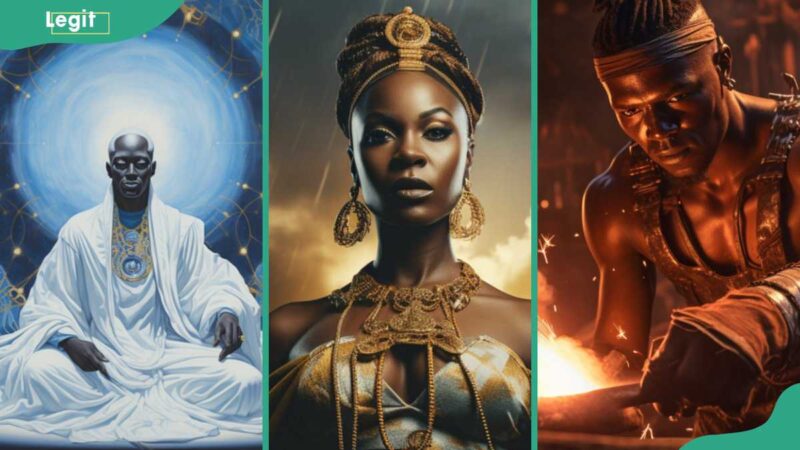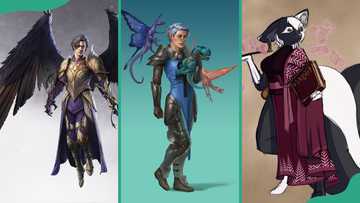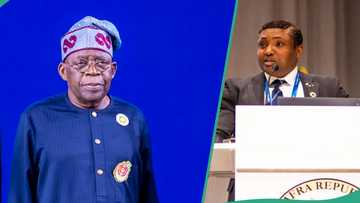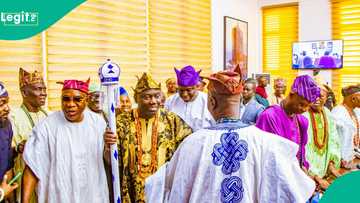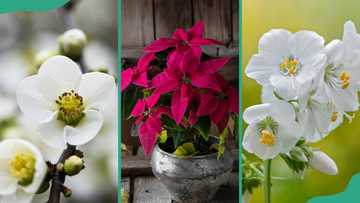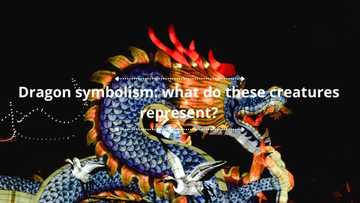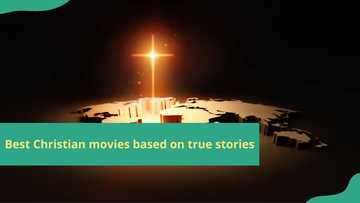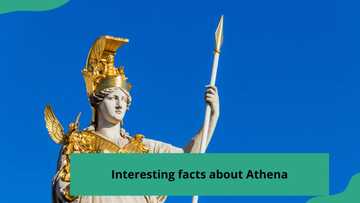The Yoruba religion is one of Africa’s oldest traditions, shaping culture and spirituality. At its center are Yoruba gods and goddesses, including Olodumare, the supreme creator, and Shango, the god of thunder. They guide, protect, and connect humans with the divine.
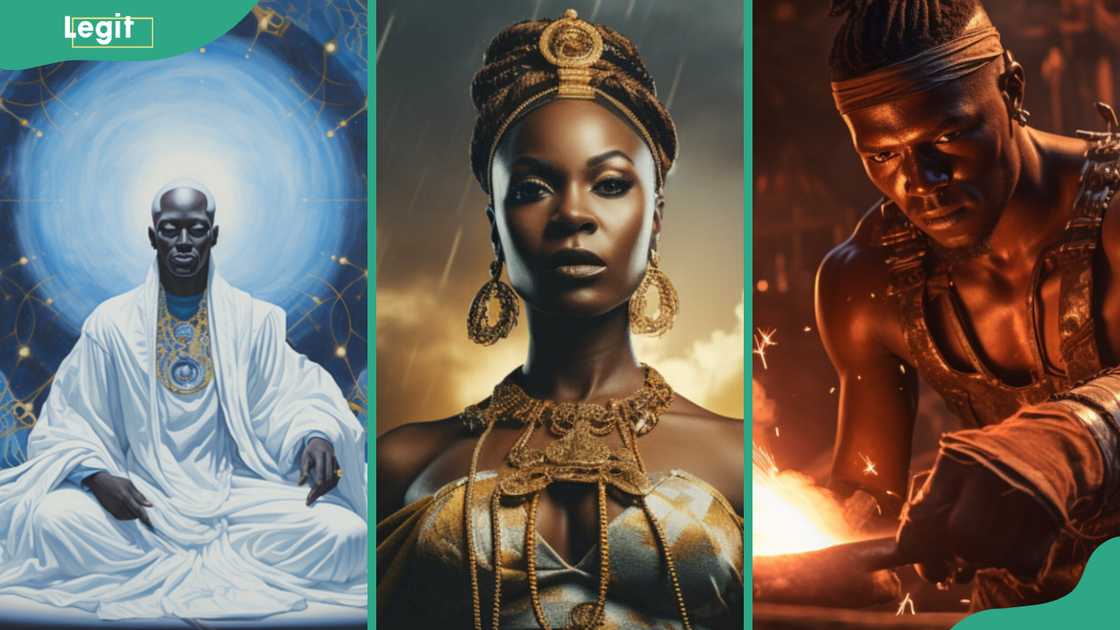
Source: UGC
TABLE OF CONTENTS
Key takeaways
- Olodumare is the supreme deity in Yoruba belief, responsible for creation and the destiny of all living beings.
- Shango, the god of thunder and lightning, symbolizes power, justice, and courage among the Yoruba.
- Oshun, the goddess of love and fertility, governs rivers and brings prosperity and harmony to her followers.
- Oya, the goddess of winds and storms, guides the transition between life and death while protecting the community.
Yoruba gods and goddesses
The Orishas are deities in Yoruba belief. In Yoruba culture, there is a list of 401 Yoruba gods, and their powers range from controlling the weather to guiding marriages. They embody natural forces and human virtues.
Together they form a vast pantheon of about 401 Yoruba gods. Each god or goddess has unique powers, symbols, and meanings. Their names and roles carry deep lessons for followers.
Historical background of Yoruba spirituality
The Yoruba religion began in ancient kingdoms in present-day Nigeria. Oral traditions preserved myths and stories for generations. Priests and elders passed teachings through rituals, chants, and divination.
Over centuries, the belief system shaped communities and guided social life. Its influence spread far beyond Yoruba lands, proving the significance of Yoruba gods and goddesses and their powers.
Major Yoruba gods and goddesses
Some Yoruba gods and goddesses are more widely known and worshipped than others. They hold key powers over nature, life, and human affairs. Each has a unique story, symbols, and rituals.
Below are profiles of the most important Yoruba gods and goddesses, including their names in the pantheon.
1. Olodumare
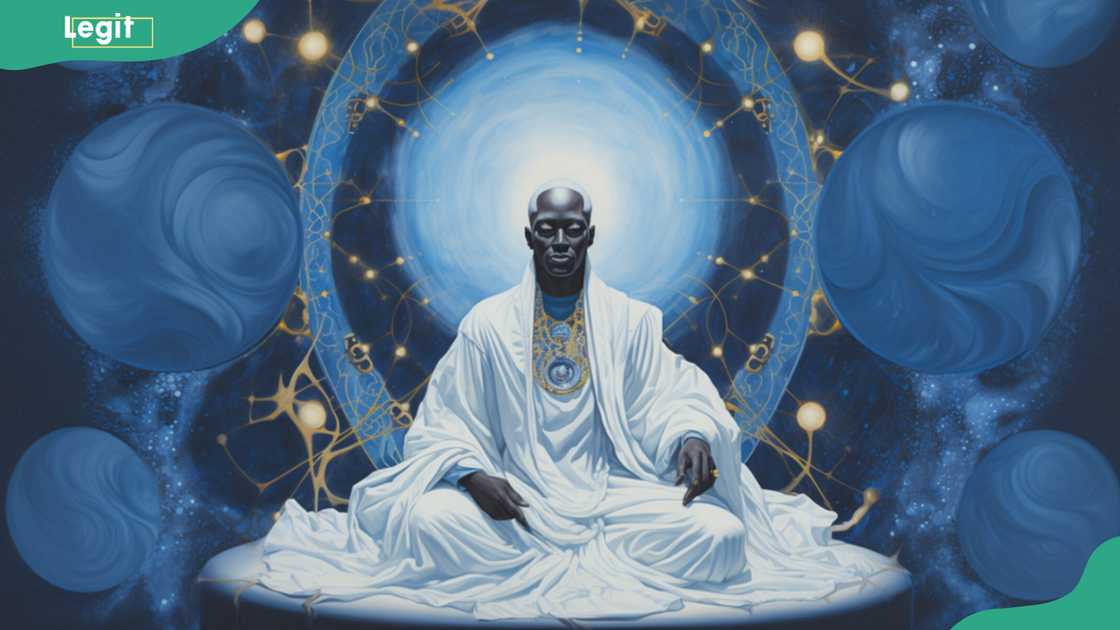
Source: UGC
- Domain: creation, destiny, supreme power
- Symbols: the sky, the sun, pure light
- Attributes: eternal, almighty, impartial, source of life
- Worship: revered in prayers but rarely offered sacrifices directly
Olodumare is the supreme deity of the Yoruba faith. He is regarded as one of the most powerful Yoruba gods. He created the universe and gave life to humanity. Unlike other Orishas, Olodumare is not usually worshipped with rituals. He is seen as distant yet ever-present. All divine power flows from him, making him the highest god.
2. Orunmila
- Domain: wisdom, knowledge, divination
- Symbols: palm nuts, divination chain, green and yellow colors
- Attributes: foresight, intelligence, balance, truth
- Worship: honored through Ifa divination and priestly rituals
Orunmila is the god of wisdom and prophecy. He always features on the list of orishas, and the powers he wields created the Ifa system used for divination. Priests called Babalawos use their teachings to guide followers.
The god helps people understand destiny and overcome struggles. He is respected as the voice of divine truth.
3. Shango
- Domain: thunder, lightning, fire, justice
- Symbols: double-headed axe, drums, fire
- Attributes: power, leadership, masculinity, intensity
- Worship: followers honor him with drumming, fire rituals, and dance
Shango is one of the most feared and loved Yoruba deities. He represents passion and authority. He was once a king of Oyo who became deified. His worship is strong in Nigeria, Cuba, and Brazil.
4. Oshun
- Domain: love, beauty, fertility, rivers
- Symbols: mirrors, honey, gold, rivers
- Attributes: charm, sensuality, compassion, generosity
- Worship: honored with offerings of honey, dance, and river rituals
Oshun is the goddess of love and beauty. She protects women and children. She is a healer and giver of prosperity. Oshun’s followers seek her for blessings in relationships, fertility, and wealth. She is among the most celebrated goddesses of the Yoruba.
5. Ogun
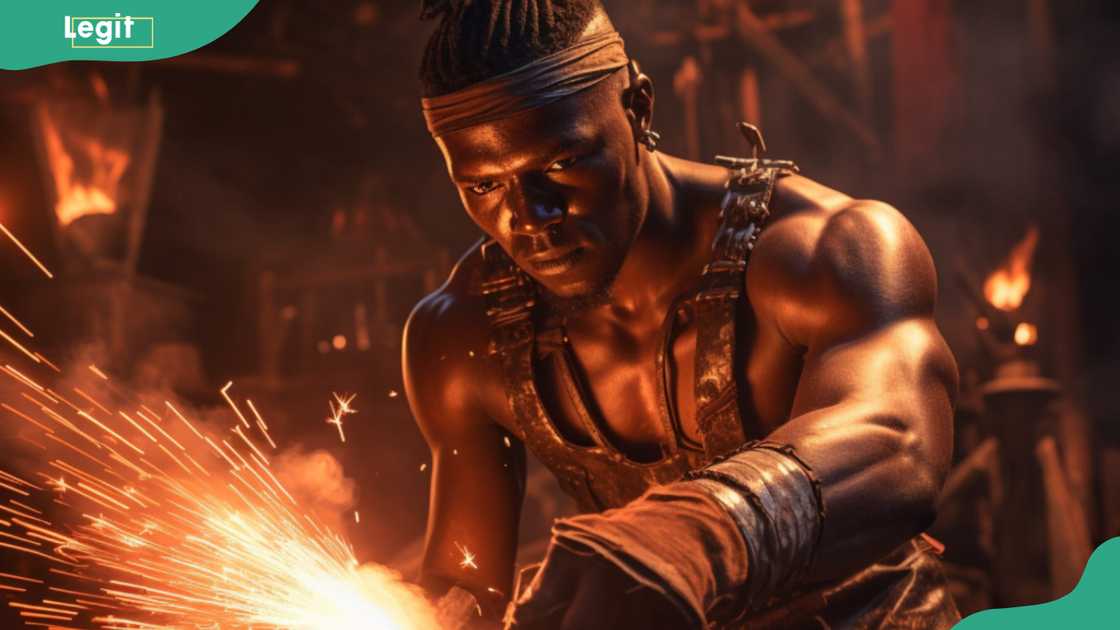
Source: UGC
- Domain: iron, war, labor, craftsmanship
- Symbols: machete, iron, tools, chains
- Attributes: strength, discipline, innovation, courage
- Worship: offerings of palm oil, dogs, and iron tools
Ogun is the god of war and iron. He rules over technology and progress. Blacksmiths and hunters seek his protection. He clears paths for civilization, but can also bring destruction, so he is considered the Yoruba god of death. Ogun is one of the most enduring Yoruba deities worshiped across Africa and the diaspora.
6. Yemoja (Yemaya)
- Domain: motherhood, oceans, creation
- Symbols: seashells, fish, water, the moon
- Attributes: nurturing, protective, maternal, powerful
- Worship: rituals by the sea with food, water, and candles
Yemaya is the mother of all living things. She embodies the ocean and its power. She protects families, especially mothers and children. She is seen as a symbol of new beginnings. In the Americas, Yemaya is celebrated in major festivals each year.
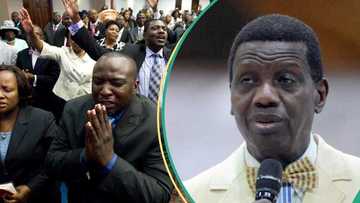
Read also
List of major 2025 prophecies by Adeboye, Apostle Selman, Ayodele, Iginla, other Nigerian pastors
7. Esu
- Domain: crossroads, communication, trickery, balance
- Symbols: keys, cowrie shells, staff
- Attributes: witty, unpredictable, just, powerful
- Worship: honored first in rituals with offerings of sweets, rum, and palm oil
Esu is the divine messenger of the Yoruba pantheon. He carries prayers and sacrifices to other deities. He rules over choices and crossroads. Known as both trickster and guardian, Esu teaches through challenge. He must always be honored before any other Orisha is invoked.
8. Obatala
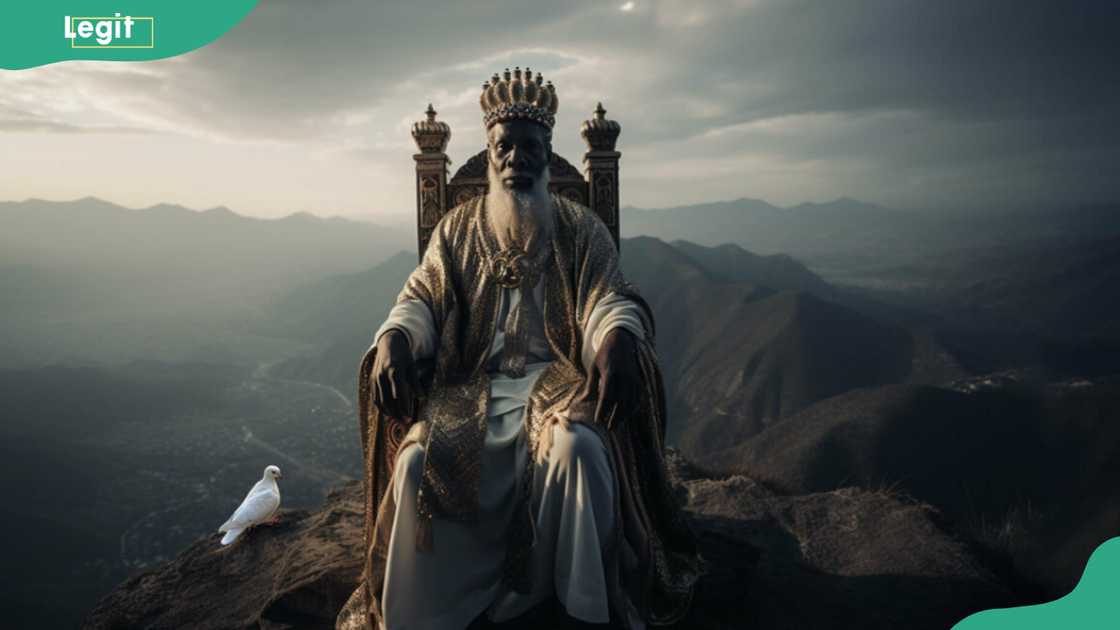
Source: UGC
- Domain: purity, creation, wisdom, justice
- Symbols: white cloth, chalk, doves
- Attributes: fairness, peace, patience, clarity
- Worship: honored with white offerings and rituals of calm
Obatala is the father of all Orishas. He created humanity with clay, while Olodumare gave life. He represents purity and wisdom. People pray to him for fairness and peace. He is seen as a merciful judge and wears only white to reflect his purity.
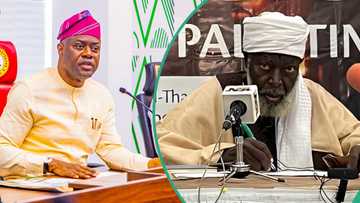
Read also
“Introduction of Shari’ah Court will bring chaos in Oyo,” Yoruba elders warn Supreme Council
9. Olokun
- Domain: the deep ocean, wealth, dreams, ancestors
- Symbols: water, seashells, fish, the moon
- Attributes: wisdom, mystery, prosperity, healing
- Worship: rituals by the sea, offerings of water and sea items
Olokun rules the depths of the ocean. This Orisha is linked to wealth, health, and hidden knowledge. Olokun is both male and female, depending on the tradition. Devotees seek Olokun for prosperity and spiritual insight. Their worship is vital in West Africa and the diaspora.
10. Orisha Oko
- Domain: agriculture, fertility, harvest, law
- Symbols: farming tools, earth, yams
- Attributes: provider, patient, balanced, nurturing
- Worship: honored with farm produce and rituals for fertility
Orisha Oko governs farming and the fertility of the land. He ensures plentiful harvests and nourishment for communities. Farmers look to him for prosperity and balance in seasons. He also plays a role in law and justice. His presence shows the sacred link between earth and humanity.
11. Oya
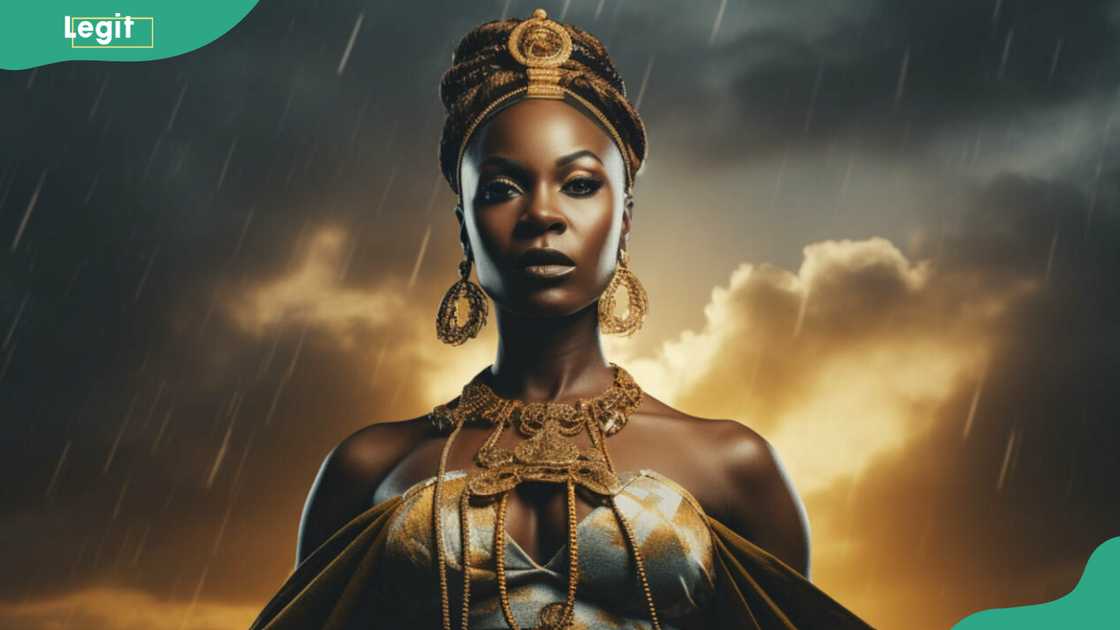
Source: UGC
- Domain: winds, storms, transformation, the marketplace
- Symbols: wind, lightning, buffalo horns, red cloth
- Attributes: fierce, transformative, protective, bold
- Worship: honored with offerings of wine, copper, and storm rituals
Oya is the goddess of storms and transformation. She controls winds and lightning. She is also linked to death and rebirth. As a guardian of the marketplace, she brings change and opportunity. Followers respect her power and make prayers to her during times of transition.
12. Egungun
- Domain: ancestors, lineage, traditions, protection
- Symbols: masks, cloth costumes, drums
- Attributes: ancestral power, guidance, discipline, continuity
- Worship: celebrated through masked festivals and ancestral rituals
Egungun represents the spirits of the ancestors. They return during ceremonies to guide and protect the living. Their appearance in colorful masks reminds people of lineage and heritage. Egungun festivals honor family ties and the continued bond between the living and the departed.
List of Yoruba gods and goddesses
The Yoruba pantheon is wide and full of meaning. Beyond the major deities, there are many others who guide life and nature. Each has a special role and power. Below is a table showing Yoruba gods and goddesses names and meanings.
Male orishas
Male orishas hold strong roles in Yoruba belief. They rule over thunder, war, farming, wisdom, and justice. Each one shapes life through his power and duty. The table below shows more of the key African deities who are male and their meanings.
| Name | Domain / powers |
| Aganjú | Volcanoes, wilderness, rivers |
| Ajala | Creation, sculptor of human bodies |
| Ajé Shaluga | Wealth, prosperity, generosity |
| Aroni | Forest spirit, herbal knowledge |
| Babalú-Ayé | Healing, disease, epidemics |
| Dada | Guardian of children |
| Elegua | Crossroads, openings, choices |
| Ikú | Death, transition |
| Inle (Erinle) | Healing, balance of river and sea |
| Iroko | Sacred tree, longevity, stability |
| Logun Ede | Duality, half in forest, half in water |
| Ochosi | Hunting, precision, justice |
| Ode | Deep forest, patience, hunting |
| Oshunmare (Osumare) | Rainbow, continuity, cycles |
| Orula | Wisdom, oracle, divination |
| Ossain | Herbal medicine, leaves, healing |
Female Orishas
Female orishas are the guardians of love, fertility, rivers, and wealth. They nurture, protect, and guide communities. Each goddess has her own power and lessons for followers. The table below shows some of the important female deities and their roles.
| Name | Domain / powers |
| Abata | Wetlands, healing, fertility |
| Aja | Forest, herbal healing |
| Aje | Material wealth, prosperity |
| Ayao | Winds, spirits of the dead |
| Ayé | Worldly abundance, resources |
| Ayelala | Divine justice, truth, oaths |
| Ìyá Nlá | Primordial mother, wisdom, justice |
| Naná Burukú | Ancient grandmother, swamps, healing |
| Oba | Marriage, loyalty, sacrifice |
| Olokun | Ocean depths, wealth, dreams |
| Onile | Earth mother, home, stability |
| Otìn | Huntress, twin sister of Ode |
Symbolism and roles in daily life
The Orishas live through rituals, festivals, and shrines. People honor them with songs, drumming, and sacrifices. Divination through Ifa guides choices and reveals destiny. Colors, animals, and sacred objects symbolize their powers. The seven powers of Yoruba tradition represent balance, strength, and harmony in life.
Yoruba gods and goddesses in the diaspora
The Yoruba religion crossed the Atlantic during the slave trade. In Cuba, Brazil, and Haiti, Orishas blended with local practices. They shaped Santería, Candomblé, and Vodun. Even today, Orishas inspire music, dance, and art. Their stories live on across continents.
Modern significance and preservation
In Nigeria, Yoruba religion remains active. Priests, healers, and communities keep traditions alive. Globally, it inspires identity, heritage, and pride. The Orishas continue to guide, teach, and protect those who honor them.
Who is the main god of Yoruba?
Olodumare is the supreme god and creator.
What is the name of the Yoruba gods?
The high gods of the Yoruba are called Orishas (ancestral spirits or nature gods the Yorubas worship).
How many Yoruba gods are there?
There are at least 401 recognized Orishas in the Yoruba pantheon.
What are the 7 powers of Yoruba?
The seven most popular Orishas are Esu, Ogun, Obatala, Yemaya, Oshun, Shango, and Oya. They are symbolic Orishas representing protection, harmony, and balance.
Who is the strongest Yoruba god?
Yoruba mythology states that Olodumare is the most powerful god. He created the Orishas to be mediators between himself and the people.
Who is the wife of Orisha Oko?
Otìn is known as his wife and companion.
Where are the Yoruba originally from?
The Yoruba people occupy southwestern Nigeria. Their ancestral father, Oduduwa, migrated from the ancient city of Mecca in Saudi Arabia to Africa.
Are there Yorubas in Cuba?
A part of Cuban population are Santeria believers or Yoruba Orisha worshippers. The Orishas believers wear all-white outfits. However, you can distinguish who worships which Orisha by looking at the colours of the ilekes or beads.
Are the Yoruba people in Brazil?
Yes, there is a percentage of Brazil’s population who are Yorubas. They were mainly captured from Oyo, Dahomey and Benin by the Portuguese and Brazilian slave traders and brought to Brazil.
The Yoruba gods and goddesses form a divine family that mirrors nature and human life. Their powers shape culture and belief from Nigeria to the Americas. They remain timeless symbols of wisdom, love, and strength.
Legit.ng recently shared an interesting article about the history of cultism in Nigeria. Cultism in Nigeria dates back to the 1950s, beginning with the formation of the Pyrates Confraternity at the University College, Ibadan.
Cults can be political, racial, destructive, polygamous, or even terrorist. They are often defined by strange spiritual, philosophical, or religious practices, and in Nigeria, they remain a persistent issue even today.
Source: Legit.ng

